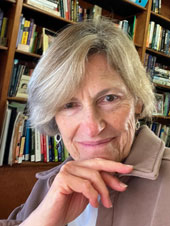04 November 2022
 With over 20 years of lecturing and counselling in diverse contexts, Dr Cathy Bettman is a champion of evidence-based mental health practices and the ideal collaborator to lead and engage with participants on the Research-themed Day 4 of our Safety Through Diversity Conference, 14-18 November 2022.
With over 20 years of lecturing and counselling in diverse contexts, Dr Cathy Bettman is a champion of evidence-based mental health practices and the ideal collaborator to lead and engage with participants on the Research-themed Day 4 of our Safety Through Diversity Conference, 14-18 November 2022.
What can attendees on Day 4 of the conference expect?
We want to engage our members and audience in dialogue, hoping that the topics and questions from our collaborators spark some rich and robust discussions. I would like to share with you the words of our Chairperson, Alexandra Bloch-Atefi, in this regard. She said that:
We hope that those who attend our Research Day will be rewarded with new ways of thinking about research, and hopefully we inspire more practitioners to do research themselves and to contribute to the evidence-base supporting the field of counselling and psychotherapy.
Ultimately, we hope for an engaging day, where diverse voices will be heard, reflecting the rich community that makes up PACFA.
How does research matter in how counselling, psychotherapy and Indigenous Healing Practices are perceived within the broader mental health sector? (Or in other words, why should practising counsellors/psychotherapists care about research?)
For quite some time, and from my perspective, even more so currently, counselling and psychotherapy have been seen as the lesser cousins to psychology. One of the reasons is that psychologists have for many years focused on growing their evidence base by largely but not entirely focusing on quantitative research methods. In the first place, therefore, it is important for us to step up to the mark and be noticed, not only by policymakers but by the man in the street as well. In addition, we need to draw attention to other paradigms, methodologies, and methods available to researchers to provide exciting and inspiring outcomes. Again, as Alexandra states:
We definitely need to be more inclusive when it comes to employing different research methodologies and frameworks that contribute to evidencing the effectiveness of psychotherapy and counselling approaches.
So, in order to reflect the diversity in our profession we need to extend beyond traditional, Western models. For example, we have found over and over again that while Randomised Controlled Trials certainly have a place they are not sufficiently accounting for the complexity inherent in our profession. We want to ensure that the research we pursue in the field of counselling and psychotherapy is as diverse and rich as our practice and the people we work with.
What are the barriers to building the evidence-base for counselling and psychotherapy?
As yet, counselling in Australia is unregulated and so achieving a PhD or other HDR (higher degree by research) degrees is not a requirement. Many counsellors are very skills-and-practice-based. They’re not affiliated with academia, funding and the bureaucratic nature of research. Also, universities offering counselling degrees are few and far between. Largely because counselling, and research, in particular, is labour-intensive and cannot be taught to huge numbers successfully.
In truth even within academia, the process of obtaining ethics approval is a very long and tedious one resulting in frustration and, at times, the withdrawal of many prospective students. A student’s candidature is not something given on the spur of the moment. Endless revisions of the research proposal by supervisors, then by members of initial committees, and finally by the Human Research Ethics Committee. Even external readers are invited to give their feedback, and this is just the beginning point. It takes three years of immersion in the process.
Can you outline your areas of interest in counselling/psychotherapy research? (And what drew you to these areas of research?)
I was drawn to conducting research when I worked as a couples and family therapist at Relationships Australia and had the opportunity to co-facilitate the men’s group. At that time, these groups followed the CBT Duluth method, and the program was called ‘Taking Responsibility.’
I felt as though I needed to know and understand more, particularly because right at the beginning of conducting a literature review, I came across evidence that in a few indigenous populations on different continents, anthropologists reported the absence of domestic violence. ‘Why was this?’ I wondered.
Where I ended up was not where I started! ‘Patriarchy: the predominant discourse and font of domestic violence’ was what my thesis ultimately was called. And for this, I was dubbed a ‘feminist researcher’ -- which delights, but also restricts, me. (I feel as much aligned with humanistic, contructivist and narrative paradigms).
Since then, as an academic responsible for student research, my involvement has been extremely diverse regarding the subject matter. I am fascinated by culture and religion, but, having said that, the smorgasbord of topics presented by students has been exciting. I have been involved exclusively with qualitative research, very much impacted by phenomenological and grounded theory concepts using semi-structured interviews for the method of data collection.
How does the counselling and psychotherapy workforce study that PACFA's Research Committee conducts contribute to the research base for our professions?
By keeping tabs on who our counsellors are, their age, their experience, their registration, the training they have had, the modalities they use, where they work, who their clients are, the delivery mode of their practice and their income, PACFA is able to make choices to support future development, to achieve professional recognition and to maintain a connection with the counselling community. In looking at how outcomes are measured and how feedback is utilised, professional standards are maintained keeping abreast with other mental health professionals.
Join Dr Cathy Bettman and her fellow collaborators on Day 4 of the ‘Safety in Diversity’ conference and explore how research can best support the presence and influence of our professions in Australia.